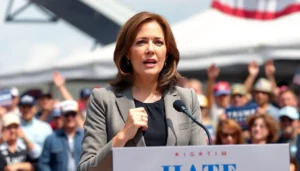In a world where diplomacy often feels like a high-stakes game of chess, moral diplomacy steps in like a knight in shining armor, ready to save the day. But what exactly does it mean? Picture this: nations not just shaking hands for trade deals, but actually caring about human rights and ethical standards. It’s like a global friendship where everyone’s invited to the party, but only if they promise to play nice.
Table of Contents
ToggleUnderstanding Moral Diplomacy
Moral diplomacy emphasizes ethical standards and human rights in international relations. Countries engage based on shared values, promoting cooperation and responsible conduct.
Historical Context
Moral diplomacy gained prominence in the early 20th century under President Woodrow Wilson. His administration aimed to promote democracy and moral governance worldwide. Other nations began to adopt similar principles, prioritizing ethical concerns over realpolitik. Events such as World War I and the League of Nations highlighted the need for cooperative international efforts grounded in morality. This historical backdrop established a framework where nations measured their relationships based on ethical conduct and adherence to human rights.
Key Principles of Moral Diplomacy
Several key principles define moral diplomacy. First, respect for human rights guides diplomatic actions. Governments prioritize the welfare of individuals, advocating for justice and freedom worldwide. Additionally, support for democratic institutions shapes ethical engagement. Nations recognize the importance of promoting governments that reflect the will of the people. Finally, commitment to international law reinforces moral diplomacy’s framework. Nations work collaboratively to uphold legal standards, ensuring accountability and fostering global stability.
Importance of Moral Diplomacy in International Relations

Moral diplomacy plays a crucial role in shaping international relations today. It focuses on aligning diplomatic efforts with ethical values and human rights.
Ethical Considerations
Ethical considerations form the backbone of moral diplomacy. Nations emphasize the significance of respect for human rights and the promotion of democracy. They prioritize accountability in international agreements. Supporting oppressed groups and advocating for social justice becomes a key feature of diplomatic initiatives. Leaders often frame their policies around moral imperatives, creating a framework where ethics guides foreign policy decisions. These principles foster trust and long-term relationships among nations.
Impact on Global Policies
The impact of moral diplomacy on global policies is profound. It encourages countries to align their diplomatic strategies with international law and ethical standards. Nations often cooperate on humanitarian issues, leading to effective global responses to crises. Promoting peace and stability becomes a common objective, influencing trade agreements and alliances. Countries adopting moral diplomacy often set benchmarks for others, encouraging broader adherence to ethical norms in international relations. Global institutions also adapt, reflecting moral diplomacy’s influence on their agendas.
Critiques of Moral Diplomacy
Critiques of moral diplomacy highlight its complexity and various challenges. Critics emphasize the idealism inherent in focusing on ethical concerns, which can sometimes clash with national interests.
Limitations and Challenges
Moral diplomacy faces limitations, including the potential for hypocrisy. Nations that claim to promote human rights may neglect their own abuses. Additionally, consensus among countries often proves difficult, hindering the implementation of moral policies. Competing interests sometimes drive diplomatic relations, which can undermine ethical standards. Realpolitik often takes precedence, making it challenging for countries to prioritize moral considerations consistently. Economic pressures and power dynamics further complicate moral diplomacy, leading to accusations of selective engagement in humanitarian issues.
Case Studies
Several case studies illustrate the challenges of moral diplomacy. The U.S. intervention in Libya, intended to protect civilians, resulted in significant instability, raising questions about the effectiveness of moral motivations. Another instance, the handling of human rights violations in China, showcases the tensions between economic ties and advocating for ethical standards. Supporting allies with questionable human rights records also highlights the inconsistencies in moral diplomacy. These examples demonstrate that while moral diplomacy aspires to align international relations with ethical values, practical obstacles often hinder its success across the globe.
Moral diplomacy represents a vital approach in international relations that emphasizes ethical standards and human rights. By prioritizing these principles, nations can foster trust and cooperation, ultimately leading to a more stable global environment. Although challenges and critiques exist, the pursuit of moral diplomacy remains crucial for encouraging accountability and promoting social justice. As countries navigate the complexities of diplomacy, aligning their actions with ethical values can pave the way for meaningful partnerships and a more just world. The impact of moral diplomacy continues to resonate, shaping policies and inspiring nations to strive for a higher standard in their diplomatic engagements.





